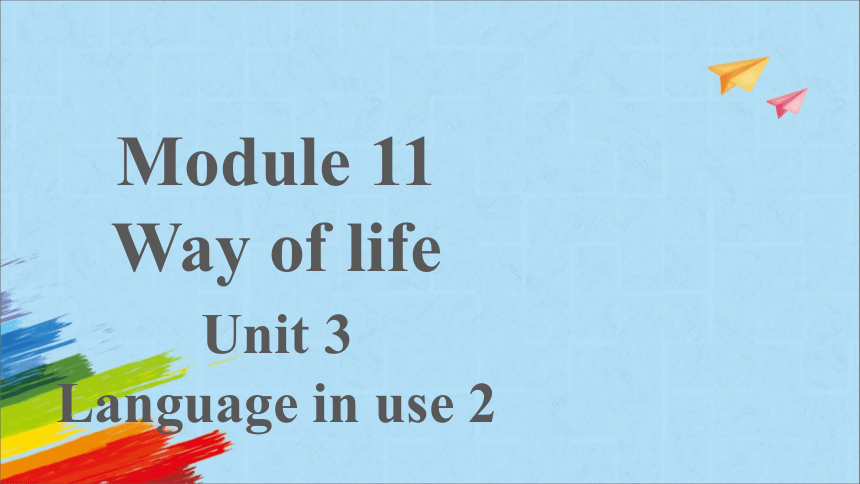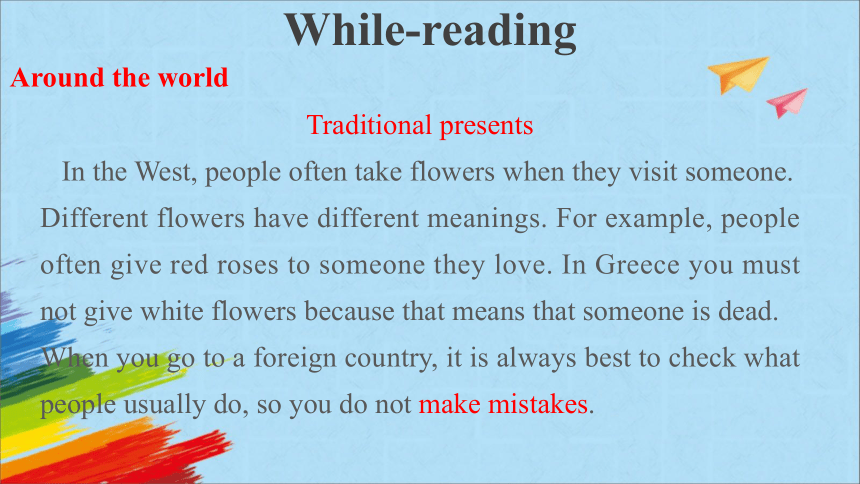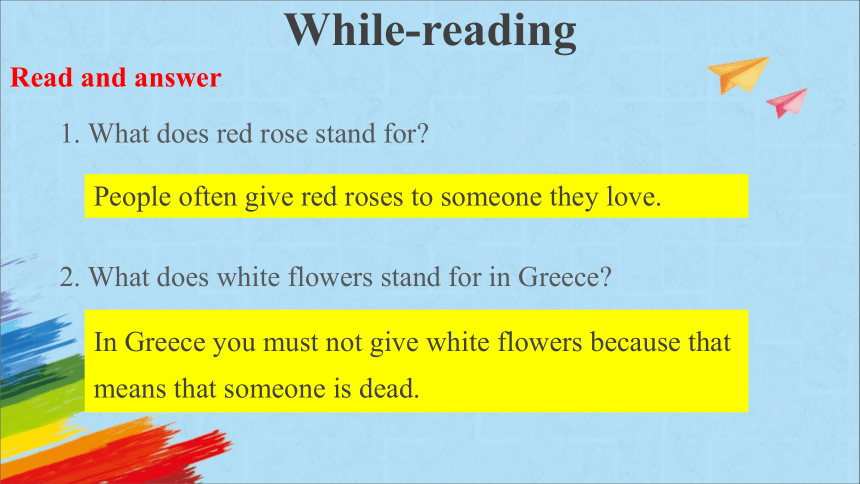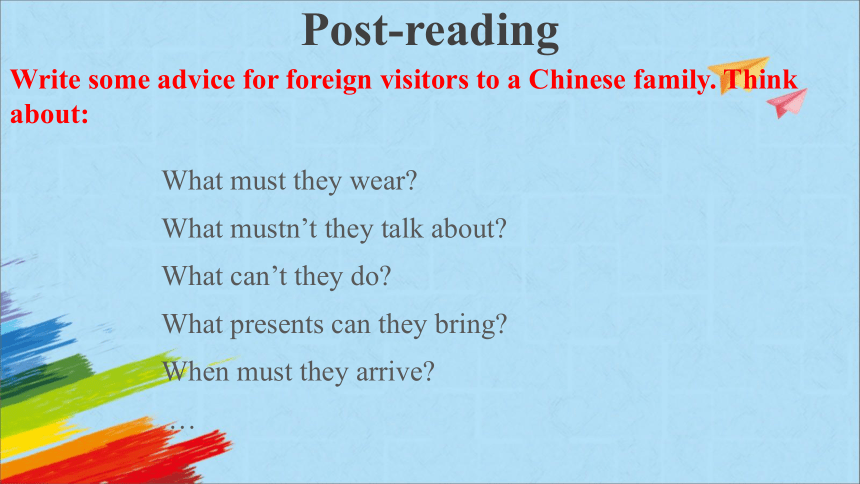外研版八年级英语上册Module 11Way of life Unit 3-2教学课件(共16张PPT)
文档属性
| 名称 | 外研版八年级英语上册Module 11Way of life Unit 3-2教学课件(共16张PPT) |  | |
| 格式 | pptx | ||
| 文件大小 | 712.3KB | ||
| 资源类型 | 教案 | ||
| 版本资源 | 外研版 | ||
| 科目 | 英语 | ||
| 更新时间 | 2022-10-14 21:14:34 | ||
图片预览







文档简介
(共16张PPT)
Module 11
Way of life
Unit 3
Language in use 2
Try to make a fact book about cultures of English-speaking countries. Write down the interesting things you find. Look for some pictures to go with them.
Pre-reading
Learning to learn
Traditional presents
In the West, people often take flowers when they visit someone. Different flowers have different meanings. For example, people often give red roses to someone they love. In Greece you must not give white flowers because that means that someone is dead.
When you go to a foreign country, it is always best to check what people usually do, so you do not make mistakes.
While-reading
Around the world
1. What does red rose stand for
2. What does white flowers stand for in Greece
While-reading
Read and answer
People often give red roses to someone they love.
In Greece you must not give white flowers because that means that someone is dead.
What must they wear
What mustn’t they talk about
What can’t they do
What presents can they bring
When must they arrive
…
Post-reading
Write some advice for foreign visitors to a Chinese family. Think about:
Work in pairs. Show the advice you wrote in Activity 9 to your group members. Choose two best pieces of advice.
Post-reading
Show the advice your group chose in Activity 10 to the whole class. Put the pieces of advice together to form your class advice.
Post-reading
Send your advice to your foreign friends or post it on your class blog.
Post-reading
1. —Can I go to the park, Mum
—Certainly. But you _______ be back by six o’ clock.
A. can B. may C. might D. must
2. In Beijing, people drive on the _______ side of the
road, while in London, people drive on the _______
side of the road.
A. left; left B. right; right
C. left; right D. right; left
Post-reading
一、选择题。
3. There must be _________ wrong with the clock.
It doesn’t work.
A. nothing B. something
C. everything D. anything
4. — May I borrow your dictionary, Sandy
— _________. But you have to return it this
afternoon.
A. No problem B. I’m sorry
C. I hope not D. I’m not sure
Post-reading
5. We can be thankful every day, not just ________
Thanks-giving Day.
A. on B. in C. at D. with
6. Eighteen kids died in the school bus accident
in Gansu Province. It’s _________ one that I
have ever heard of.
A. a very serious B. a more serious
C. the most serious D. the least serious
Post-reading
二、用must, mustn’t, can, can’t, needn’t 填空。
1. Don’t open the present now! You ________ wait and open it later.
2. —Must I take them to the bedroom now
— No, you ________. Your father will take them.
3. — ________ you help me with my English lesson
— Of course.
4. They ________ go to the museum, for they have no money
at the moment.
5. In Britain, you ________ drive a car if you are under the
age of eighteen.
must
needn’t
Can
can’t
mustn’t
Post-reading
三、句型转换
1. It is best to take an umbrella with you. (改为同义句)
______ ______ ______ take an umbrella with you.
2. — Must I get up early tomorrow morning
— ______, you ________.
3. I visit my grandmother once a week.(对画线部分提问)
______ ______ do you ______ your grandmother
4. You mustn’t give white flowers when you visit someone in Greece
(对画线部分提问)
______ ______ ______ ______ when you visit someone in Greece
You
had
better
No
needn’t
How
often
visit
What
mustn’t
you
do
Post-reading
1. Around the world:
When you go to a foreign country, it is always best to check
what people usually do, so you do not make mistakes.
2. Some advice for foreign visitors to a Chinese family.
What must they wear
What mustn’t they talk about
What can’t they do
What presents can they bring
When must they arrive
…
Summary
Write a composition of making the rules for the new school library.
Homework
Goodbye!
Module 11
Way of life
Unit 3
Language in use 2
Try to make a fact book about cultures of English-speaking countries. Write down the interesting things you find. Look for some pictures to go with them.
Pre-reading
Learning to learn
Traditional presents
In the West, people often take flowers when they visit someone. Different flowers have different meanings. For example, people often give red roses to someone they love. In Greece you must not give white flowers because that means that someone is dead.
When you go to a foreign country, it is always best to check what people usually do, so you do not make mistakes.
While-reading
Around the world
1. What does red rose stand for
2. What does white flowers stand for in Greece
While-reading
Read and answer
People often give red roses to someone they love.
In Greece you must not give white flowers because that means that someone is dead.
What must they wear
What mustn’t they talk about
What can’t they do
What presents can they bring
When must they arrive
…
Post-reading
Write some advice for foreign visitors to a Chinese family. Think about:
Work in pairs. Show the advice you wrote in Activity 9 to your group members. Choose two best pieces of advice.
Post-reading
Show the advice your group chose in Activity 10 to the whole class. Put the pieces of advice together to form your class advice.
Post-reading
Send your advice to your foreign friends or post it on your class blog.
Post-reading
1. —Can I go to the park, Mum
—Certainly. But you _______ be back by six o’ clock.
A. can B. may C. might D. must
2. In Beijing, people drive on the _______ side of the
road, while in London, people drive on the _______
side of the road.
A. left; left B. right; right
C. left; right D. right; left
Post-reading
一、选择题。
3. There must be _________ wrong with the clock.
It doesn’t work.
A. nothing B. something
C. everything D. anything
4. — May I borrow your dictionary, Sandy
— _________. But you have to return it this
afternoon.
A. No problem B. I’m sorry
C. I hope not D. I’m not sure
Post-reading
5. We can be thankful every day, not just ________
Thanks-giving Day.
A. on B. in C. at D. with
6. Eighteen kids died in the school bus accident
in Gansu Province. It’s _________ one that I
have ever heard of.
A. a very serious B. a more serious
C. the most serious D. the least serious
Post-reading
二、用must, mustn’t, can, can’t, needn’t 填空。
1. Don’t open the present now! You ________ wait and open it later.
2. —Must I take them to the bedroom now
— No, you ________. Your father will take them.
3. — ________ you help me with my English lesson
— Of course.
4. They ________ go to the museum, for they have no money
at the moment.
5. In Britain, you ________ drive a car if you are under the
age of eighteen.
must
needn’t
Can
can’t
mustn’t
Post-reading
三、句型转换
1. It is best to take an umbrella with you. (改为同义句)
______ ______ ______ take an umbrella with you.
2. — Must I get up early tomorrow morning
— ______, you ________.
3. I visit my grandmother once a week.(对画线部分提问)
______ ______ do you ______ your grandmother
4. You mustn’t give white flowers when you visit someone in Greece
(对画线部分提问)
______ ______ ______ ______ when you visit someone in Greece
You
had
better
No
needn’t
How
often
visit
What
mustn’t
you
do
Post-reading
1. Around the world:
When you go to a foreign country, it is always best to check
what people usually do, so you do not make mistakes.
2. Some advice for foreign visitors to a Chinese family.
What must they wear
What mustn’t they talk about
What can’t they do
What presents can they bring
When must they arrive
…
Summary
Write a composition of making the rules for the new school library.
Homework
Goodbye!
同课章节目录
- Module 1 How to learn English
- Unit 1 Let's try to speak English as much as possi
- Unit 2 You should smile at her.
- Unit 3 Language in use .
- Module 2 My home town and my country
- Unit 1 It's taller than many other buildings.
- Unit 2 Cambridge is a beautiful city in the east o
- Unit 3 Language in use .
- Module 3 Sports.
- Unit 1 Nothing is more exciting than playing tenni
- Unit 2 This year we training more carefully.
- Unit 3 Language in use .
- Module 4 Planes, ships and trains .
- Unit 1 He lives the farthest from school.
- Unit 2 What is the best way to travel.
- Unit 3 Language in use .
- Module 5 Lao She Teahouse.
- Unit 1 I wanted to see the Beijing Opera.
- Unit 2 It descibes the changes in Chinese society.
- Unit 3 Language in use .
- Module 6 Animals in danger.
- Unit 1 It allows people to get closer to them .
- Unit 2 The WWF is working hard to save them all.
- Unit 3 Language in use .
- Revision module A
- Module 7 A famous story
- Unit 1 Alice was sitting with her sister by the ri
- Unit 2 She was thinking about her cat.
- Unit 3 Language in use .
- Module 8 Accidents
- Unit 1 While the car were changing to red, a car s
- Unit 2 I was trying to pick it up when it bite me
- Unit 3 Language in use .
- Module 9 Population
- Unit 1 The population of China is about 1.37 billi
- Unit 2 Arnwick was a city with 200,000 people.
- Unit 3 Language in use .
- Module 10 The weathe
- Unit 1 It might snow.
- Unit 2 The weather is fine all year round.
- Unit 3 Language in use .
- Module 11 Way of life
- Unit 1 In China ,we open a gift later.
- Unit 2 In England, you usually drink tea with milk
- Unit 3 Language in use .
- Module 12 Help
- Unit 1 What should we do before help arrives?
- Unit 2 Stay away from windows and heavy furniture.
- Unit 3 Language in use .
- Revision module B
